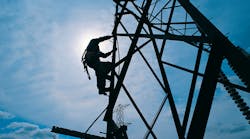How Electrical Lineman Can Prioritize Safety On The Job
Utility work is essential for keeping electricity running into our homes, but it is also highly dangerous. Linemen risk falls, electric shocks, burns, and other injuries while on the job every day, and these incidents can even be fatal.
So, what can utility workers do to minimize these risks?
As a lineman, you can understand the magnitude of the hazards you face and take workplace safety measures to keep yourself and those around you safe. This will allow you to wake up every day and do the work that serves your community.
What are the risks of utility work?
By working on electrical lines, utility workers face some of the most dangerous tasks in the industry. It’s important for workers to be aware of these hazards. According to the U.S. Department of Labor, these risks include:
- Electrocution
- Falls
- Confined spaces
- Fires and explosions
- Sprains, strains, and fractures
- Environmental Stress
Even if you have been working as a lineman for decades, it’s still essential to know these risks. This will ensure that you are taking clear safety measures and following best practices for line work.
What can workers do to keep themselves safe?
While utility work is dangerous, there are ways to protect yourself and others from the injuries and hazards listed above. There are clear safety best practices that you and your crew can follow to ensure that the job gets done without incident. And to truly ensure safety, you must stay alert.
“It’s that little routine – ‘Oh, go out there and change out this little single-phase line’ – something like that,” Mike Boyd, founder of Fallen Lineman, said in a statement to Safety and Health. “It’s about focus and being your brother’s keeper. Maybe you’ve got something on your mind – you and your wife had a fight that day, or you had a bad night, whatever it is. It’s about looking out for one another.”
The following are just some of the safety best practices that you can follow to look out for yourself and others.
- Stay aware of your surroundings. When working on the line, even a small movement can lead to an accident. Move mindfully and be aware of the tools around you.
- Use tools appropriately. Never use a tool you are not familiar with and always practice proper tool safety. Utility company managers might consider holding trainings to keep workers up to date on these safety best practices.
- Always work in teams. While you likely have multiple people working with you, that does not mean you are working as a team. Be sure that you and your fellow crew members are communicating and looking out for each other’s safety.
- Take your time. Many accidents occur when workers try to rush a job. Even if you are a master of your craft, work slowly and use proper technique. This will ensure that the job is done properly as well.
- Wear proper safety equipment. This is one of the most important safety steps that you can take. In the event of an incident, your helmet, gloves, shoes, and clothing will provide an extra layer of protection.
Remember: You often have control of your safety and the safety of those around you. By staying diligent and speaking up when you see a hazard, you can keep utility work productive and fulfilling. For more information on linemen safety, review OSHA’s Electric Power Generation, Transmission, and Distribution Industry safety guidelines.


